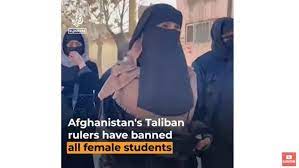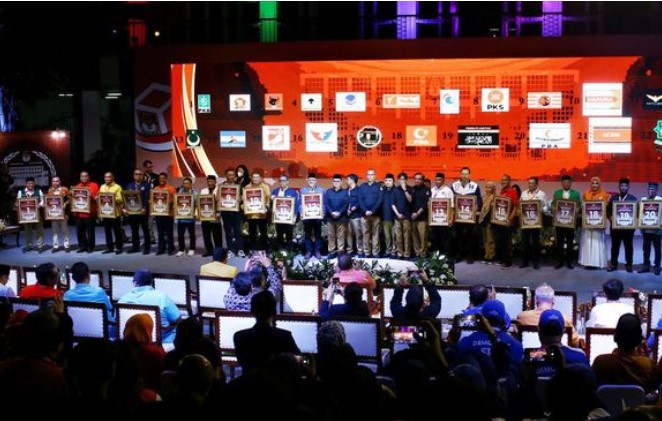
Parpol lolos Pemilu 2024
STRATEGIC ASSESSMENT. Indonesian lawmakers canceled plans to ratify controversial revisions to the country’s election laws, the deputy speaker of Parliament said after thousands of protesters rallied in front of the Parliament building. If implemented, the changes could have further enhanced the political influence of outgoing President Joko Widodo.
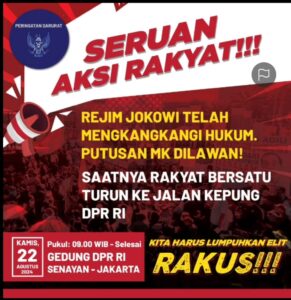
Parliament met in an emergency session to overturn one decision made by Indonesia’s Constitutional Court on election procedures, while amending another. But the legislature canceled the ratification after failing to achieve a quorum amid the protests outside.
Indonesian legislators have cancelled plans to ratify revisions to election laws, the deputy speaker of parliament says after thousands of people protested in front of the parliament building.
Parliament was preparing to reverse a Constitutional Court order over candidate age requirements for upcoming regional polls, superseding a ruling that had made President Joko Widodo’s youngest son, 29-year-old Kaesang Pangarep, ineligible.
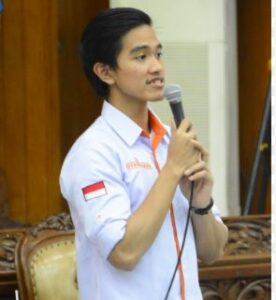
Constitutional Law expert Herdiansyah Hamzah from Mulawarman University describes the House and government’s revision of the Pilkada Law, while disregarding the MK ruling, as “madness” and a defiance of the constitution… Political observer Ray Rangkuti from Lingkar Madani also criticizes the revision, labeling it illegal due to procedural flaws, such as the lack of an agenda for revision and the absence of academic studies and public consultations.
Indonesian President-elect Prabowo Subianto has tightened his grip over the parliament after all but one of the parties with seats in the legislature joined his coalition.
But the newly enlarged group immediately courted controversy, and prompted calls for protests, after it proposed amending a law to defy a Constitutional Court ruling that relaxes the rules on who can nominate candidates in the November elections for regional leaders.
Golkar Party appointed a top loyalist of President Jokowi as its new chairman, a move members say could allow the outgoing president to retain political influence long after he leaves office in October.

Bahlil Lahadalia, the newly appointed energy minister and the president’s right-hand man, was chosen as party leader at the annual congress of Golkar, the party of the late autocrat President Suharto, who ruled Indonesia for three decades until 1998. Four Golkar sources told Reuters that Bahlil’s appointment could help Jokowi to secure his legacy after Prabowo takes power. Golkar members have said that Jokowi has been quietly angling to shore up his power base through the party before stepping down.
PDI-P politician Masinton Pasaribu confirmed that his party will continue to nominate a candidate in the 2024 Jakarta gubernatorial election, despite the House and government revising the Law. Masinton said that his party would nominate former Jakarta Governor Anies Baswedan on Aug. 27.
Adhi Priamarizki, Research Fellow at S. Rajaratnam School of International Studies, Nanyang Technological University, Singapore said Airlangga Hartarto announced his resignation as the Golkar Party chairman on Aug. 10. The announcement reinvigorated speculation about the intentions of President Joko “Jokowi” Widodo to take over Golkar, the country’s second-largest party. The issue of Airlangga’s removal quickly faded following support for his Golkar chairmanship from the President’s inner circle, such as Coordinating Maritime Affairs and Investment Minister Luhut Pandjaitan. Jokowi himself denied the allegation he was meddling in Golkar’s internal affairs.
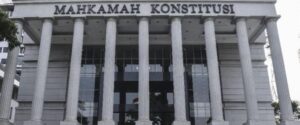
The Constitutional Court was issued a ruling to abolish the threshold for political parties or coalitions of parties to be able to nominate candidates for local heads in the November regional head election, a ruling which activists hailed as a win for democracy. In response to a petition filed by two small political parties, the Labor Party and Gelora Party, the court ruled that the 20 percent threshold of legislative seats in the regional council or 25 percent of the popular vote would not be applicable in the November regional election, dropping the popular vote threshold to 7.5 percent. This revision will allow the Indonesian Democratic Party of Struggle (PDI-P) to potentially nominate Anies Baswedan for Jakarta governor.
Indonesian civil society activists hailed a Constitutional Court ruling to revise requirements for a political party to nominate a candidate in elections for regional heads, saying it would preserve democratic principles by preventing big parties from dominating races. This provision makes regional head candidates who do not meet the age requirements fail to advance in the 2024 regional elections, including Kaesang Pangarep, President Jokowi’s youngest son and Indonesian Solidarity Party (PSI) Chair.
Energy and Mineral Resources Minister Bahlil Lahadalia has garnered unanimous backing from delegates of all regional chapters of the Golkar Party to become its next chairman during the party’s national congress, a senior party official said. Golkar Party interim chairman Agus Gumiwang Kartasasmita, on the sidelines of the Golkar National Congress at the Jakarta Convention Center (JCC), on Tuesday announced that the verification process for chairman candidates is complete and that Bahlil Lahadalia is the sole qualified candidate. Bahlil is expected to be formally appointed as chairman by acclamation on the second day of the congress, according to Golkar Party Deputy Chairman Adies Kardi, who chaired the plenary session.
Bahlil Lahadalia, a close aide of President Jokowi, has won an uncontested race for the Golkar Party chairmanship, an outcome analysts say creates an opportunity for the outgoing President to join the party’s ranks. Analysts see Golkar as the most logical route for Jokowi to maintain influence after stepping down from office in October, mainly because of the party’s influence in the House of Representatives.

The National Awakening Party (PKB) has dismissed Religious Affairs Minister Yaqut Cholil Qoumas and two other prominent figures amid escalating tension between the party and the country’s biggest Muslim organization Nahdlatul Ulama (NU). PKB Deputy Chairman Hanif Dhakiri said recently that Yaqut, NU Chairman Yahya Cholil Staquf, and Lukman Edy have been fired by the party for serious violations of internal rulings.
Made Supriatma, Visiting Fellow in the Indonesia Studies Programme, ISEAS – Yusof Ishak Institute said the Indonesian parliament (DPR) has been quite active during its lame-duck session. The outgoing DPR and government have intensified their efforts to pass various controversial pieces of legislation that could significantly impact Indonesian politics. Currently, the DPR is discussing several contentious amendments to existing laws that would be unlikely to pass under normal circumstances. The proposed amendments were drafted hastily, without transparency, and isolated from public discussion. Many were surprised when they learned that the amendments had already passed the public consultation stage.
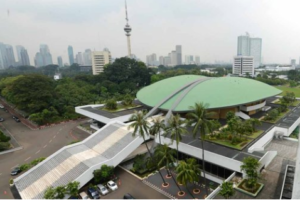
The Law on the Constitutional Court has undergone its fourth amendment since its introduction in 2001. This latest amendment focuses on technical issues but carries substantial implications. It allows a judge to be re-elected after completing their term, contingent on passing an evaluation by the government and the DPR. There is suspicion that this is the government and DPR’s attempt to control Constitutional Court judges, as this would erode judicial independence by making judges beholden to politicians and the legislature.
In October last year the Constitutional Court, or Mahkamah Konstitusi in Indonesian, became a laughingstock, with netizens branding the once respected judicial institution the Mahkamah Keluarga (family court), after it revised the age limits for presidential and vice presidential candidates to allow President Joko “Jokowi” Widodo’s eldest son Gibran Rakabuming Raka to contest as ’s running mate. Not only did the ruling defy the public clamor against dynastic politics, but it also devastated the integrity and credibility of the court as a product of the reform movement. The damage was done with the help of then-chief justice Anwar Usman, who is President Jokowi’s brother-in-law.
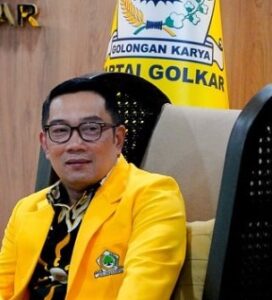
Former West Java Governor Ridwan Kamil has been officially declared a prospective candidate for the upcoming Jakarta gubernatorial election. Ridwan Kamil, a Golkar Party cadre, will run in the election alongside a Prosperous Justice Party (PKS) member, Suswono. Ridwan Kamil-Suswono duo is backed by the Onward Indonesia Coalition (KIM) Plus, a combination of the Onward Indonesia Coalition that supported Prabowo, and several other parties.
PDI-P continues to seek coalition partners to secure a nomination ticket for Anies Baswedan and Hendrar Prihadi, but prospects appear slim as most parties have already joined the Onward Indonesia Plus Coalition. PDI-P Central Council Chair Said Abdullah said that his party is still lobbying political parties in Jakarta to nominate Anies Baswedan, adding that his party is considering former Semarang Mayor Hendrar Prihadi to run alongside Anies in Jakarta.
Tenggara Strategics has analyzed Golkar Party chairman Airlangga Hartarto sent shockwaves through Indonesia’s political landscape when he abruptly stepped down from his position as the leader of the country’s second-largest party. While Airlangga claimed his decision was to ensure a “stable transition” between the current administration and the next, others have speculated that it was due to an underhanded maneuver by President Joko “Jokowi” Widodo. The timing of Airlangga’s resignation has drawn the attention of many, given that he was supposed to step down from his post in December when Golkar was slated to hold its national congress (Munas) to elect the chairman for the 2024-2029 period. Amid talk of there being an extraordinary congress (Munaslub) held before December, which Airlangga and other Golkar executives such as Jusuf Kalla had previously denied, speculation has it that an outside force is looking to seize the leadership of Indonesia’s oldest party.
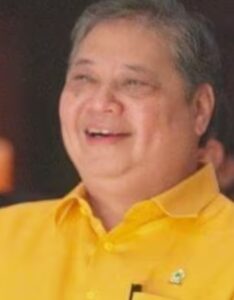
Despite the Presidential Palace’s vehement denial, there are several indications that suggest Jokowi’s hand in this political surprise. For one, Jokowi has a track record of using graft cases to keep both his political allies and rivals in check. Airlangga stepped down from his post just a couple of weeks after being questioned by the Attorney General’s Office (AGO) in the ongoing, two-year investigation into a corruption case related to crude palm oil (CPO) export permits. In July last year, he also faced the music in the case.
Alldo Fellix Januardy, Managing Partner of Jakarta-based AVYA Law Firm and Co-Founder of LogikaRasa and Muthia Zahra Feriani, Director of Arseri Creative House and Co-Founder of LogikaRasa said proposed amendments to Indonesia’s broadcasting law have sparked significant concern among journalist organizations, which fear for the future of press freedom and investigative journalism. The Indonesia Press Council has criticized the revised broadcasting bill, arguing that it conflicts with the principles established by existing legislation and threatens to degrade journalism.
The amendments, introduced in 2020 and finalized in October 2023, were largely undisclosed until recently. The bill aims to update the 2002 broadcasting law to address challenges posed by new media platforms, but it has faced a backlash from journalist groups because it plans to restrict investigative journalism as a media product (Article 50B of the bill). Although still only one of many of the bill’s controversies, this raises a critical question: Is the amendment a step back for Indonesian democracy?
Indonesia’s president-elect Prabowo Subianto has secured a parliamentary majority after the party that backed his rival in the February elections announced it was joining his big-tent coalition. The NasDem party, which accounts for about 10 percent of parliament that it would support the incoming administration of Prabowo. The National Awakening Party (PKB) will reunite with President-elect Prabowo Subianto after their relationship took a roller-coaster ride in the last election. PKB Chairman Muhaimin Iskandar confirmed that the party will not take an opposition stance against Prabowo.
At the annual People’s Consultative Assembly (MPR) plenary session, House of Representatives Speaker Puan Maharani lamented the declining state of democracy in Indonesia in what appeared to be a jab at outgoing President Jokowi. Puan, a politician of the Indonesian Democratic Party of Struggle (PDI-P), highlighted the people’s power in a democratic country, saying that the people should prevail as victors in elections and that elections are supposed to be “a celebration of democracy.” She also underlined that Indonesia is “a country for everyone, not just for one person or group.”
PDI-P Chairwoman Megawati Soekarnoputri criticized political and legal conditions said that Indonesian law is currently being manipulated by a figure who appears populist to many people. She warned the rulers not to use the law as a tool for power. A senior aide to President Jokowi has denied an allegation that the outgoing president had resorted to using law enforcement agencies to intimidate politicians within and outside of his government into supporting his agendas. Coordinator of President Jokowi’s special aides Ari Dwipayana said in a press statement published that the claim made by Indonesian Democratic Party of Struggle (PDI-P) secretary general Hasto Kristiyanto alleging that the President marshaled law enforcers to do his bidding was false and unsubstantiated.
During his last State of the Nation Address, President Joko “Jokowi” Widodo opted to take the easy way out. He washed his hands clean of the past decade of pragmatic rule with an apology that does not do justice to the harm he and his government has inflicted. There was arguably not much substance for what would be the President’s last big speech to the legislature. In fact, there was much more meat in the opening address delivered by House of Representatives Speaker Puan Maharani – but more on that later. In his speech, Jokowi chose to stick to achievements that can be measured in numbers or brandished in plain sight. He boasted about the many units of physical infrastructure built to connect the archipelago – a key component of his administration’s work.
National Democratic Party (Nasdem) Chairman Surya Paloh confirmed that his party will not endorse Anies Baswedan in the upcoming Jakarta gubernatorial election. Surya hinted at a potential shift toward the growing Onward Indonesia Coalition (KIM), which has begun to rally around the candidacy of Ridwan Kamil, the former governor of West Java. Surya Paloh announced after meeting Prabowo that his party has decided to join the Prabowo-Gibran administration. He indicated that Nasdem is interested in assisting Prabowo’s government.
The Indonesian Unity Party (Perindo) and the United Development Party (PPP) have declared their support for the Prabowo Subianto-Gibran Rakabuming Raka administration. Perindo Chairwoman Angela Tanoesoedibjo said, “This is our form of friendship… Because if we want to contribute more, we must support the government,” she said.
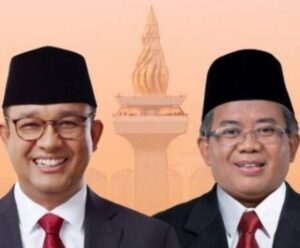
The Prosperous Justice Party (PKS) has rejected claims that it is responsible for the uncertainty around Anies Baswedan’s candidacy in the upcoming Jakarta gubernatorial election. PKS argues that Anies has failed to secure the to meet the nomination threshold requiring support fromat least 22 seats in the Jakarta legislature to nominate a candidate. While PKS has pledged its support, it only holds 18 seats. In a voice note to Anies, PKS Jakarta Chapter Head Khoirudin hinted that the party might withdraw its support due to Anies’ inability to gain backing from other parties with at least four seats.
President-elect and Gerindra Party Chair Prabowo Subianto announced that the Prosperous Justice Party (PKS) will likely join the Onward Indonesia Coalition (KIM) “plus” which supports Ridwan Kamil for the 2024 Jakarta gubernatorial election.
The Jakarta Post Editorial Board has written if political parties were corporations, it may be time to red-flag their maneuvers ahead of November’s regional head elections. While it is not yet official, the alliances they are forming to nominate their chosen candidates in some key regions have become so large that they are blocking opportunities for other candidates to run.
The four political parties that formed the winning team behind president-elect Prabowo Subianto – Gerindra, Golkar, the Democratic Party and the National Mandate Party (PAN) under the Indonesia Onward Coalition (KIM) – have built a cartel-like alliance for their preferred candidates in strategic regions such as Jakarta and East Java. This is making it difficult, if not impossible, for other parties to garner enough support to field opposing tickets.
Maritime Affairs and Investment Coordinating Minister Luhut Binsar Pandjaitan said that President-elect Prabowo Subianto plans to announce his cabinet on Oct. 21, a day after his inauguration.
Chairman of the youth-oriented Indonesian Solidarity Party (PSI) Kaesang Pangarep, the 29-year-old son of outgoing President Jokowi, said that he could go toe-to-toe in the Jakarta gubernatorial election with stronger candidates like Anies Baswedan and Ridwan Kamil. Kaesang also said that he would be ready to join the race in Jakarta if the capital city’s people want him to run. Kaesang however was quick to add that the final decision on whether to run in the race would depend on the political stance taken by president-elect Prabowo Subianto’s Onward Indonesia Coalition (KIM).
The coalition of political parties comprises the Great Indonesia Movement Party (Gerindra), the Golkar Party, the Democratic Party, and the National Mandate Party (PAN), that successfully nominated Prabowo Subianto for president has endorsed former West Java Governor Ridwan Kamil for the upcoming gubernatorial race in Jakarta, Gerindra acting chairman Sufmi Dasco Ahmad announced. Ridwan’s running mate will be announced in a few days, Dasco said.
The Indonesian Democratic Party of Struggle (PDI-P) has announced its decision to nominate its own candidate for the Jakarta gubernatorial election, declining to join the coalition supporting Ridwan Kamil, PDI-P’s central leadership board member Said Abdullah said.



